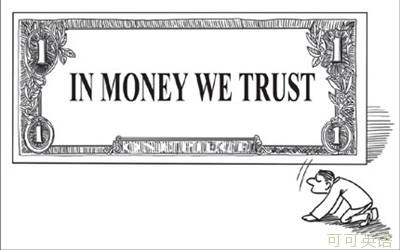Books and Arts; Book Review;Money and the markets;Insatiable longing
文藝;書評;金錢與市場;貪婪的欲求:資本主義的局限性;
Two new books probe the limits of capitalism;
兩本探討資本主義局限性的新書;
How Much Is Enough? Money and the Good Life. By Robert Skidelsky and Edward Skidelsky.
《多少才算夠?金錢與良好生活》,作者:羅伯特·斯科德爾斯基和愛德華·斯科德爾斯基。
What Money Can't Buy: The Moral Limits of Markets. By Michael Sandel.
《錢買不到的東西:市場的道德局限性》,作者:邁克爾·桑德爾。

MOST policymakers, and the economists who advise them, believe that the rich Western economies have suffered a mechanical malfunction. With the right monetary, fiscal and regulatory tools, the growth machine will eventually whirr into life. Others think the West's true malaise is not mechanical but moral: a love of money, markets and material things.
在大多數當權者以及向他們建言的經濟學家看來,富裕的西方經濟遭遇了機制性的失調。只要運用正確的貨幣和財政政策及監管工具,經濟增長機器終究會恢復生機。但另有一些人認為,西方世界的真正病因不是源自機制,而是源自道德:是對金錢、市場和物質生活的追逐。
“How Much Is Enough?” and “What Money Can't Buy” are well-argued versions of this second view. In the former, Robert and Edward Skidelsky, a father-and-son pair of British academics, take as their text an essay written in 1930 by John Maynard Keynes. Keynes (of whom the elder Skidelsky has written a three-volume biography) mused that within a century “the economic problem” would be solved: in rich countries people would be at least four times wealthier, on average, and have to work perhaps 15 hours a week. He looks right about living standards, but horribly wrong about working hours.
《多少才算夠?》和《錢買不到的東西》這兩本書,雄辯地論證了上面所說的第二種觀點。前一本書的作者是英國父子學者羅伯特·斯科德爾斯基和愛德華·斯科德爾斯基。他們在書中從約翰·梅納德·凱因斯在1930年寫的一篇論文說起(羅伯特·斯科德爾斯基曾寫過三卷本的凱恩斯傳記)。凱恩斯在那篇論文文中預言,不出一百年,“經濟問題”將不成其為問題。在富裕國家中,人們的財富將增加三倍,平均每周將只工作15小時。他對生活水平的預言看來是對的,但對工作時間的預言卻大錯特錯了。
In the rich world the modern economic problem, the Skidelskys say, is how to live well amid plenty, not how to survive amid scarcity. Yet the West still chases slavishly after ever-higher gross domestic product, a purely material measure that takes no account of the blessings of nature or leisure. Humanity has become insatiable, in short. It is time to stop and rediscover the “good life”. This they identify with a list of “basic goods”: health, security, respect, “personality” (autonomy, if you prefer), harmony with nature, and leisure.
斯科德爾斯基父子認為,在富裕世界里,現時的經濟問題已經不是如何在短缺的環境中掙扎生存,而是如何在豐裕的環境中過高質量的生活。但是西方世界仍然在竭力追求不斷增長的GDP(國內生產總值)。GDP是一個純粹的物質性指標,完全忽略自然和閑適的價值。簡言之,人類已經變得貪得無厭。現在已經到了反思和重新定義“良好生活”的時候了。他們對良好生活的定義包括一系列“基本條件”:健康、安全、尊嚴、“個性”(或者說“自主”)、與自然的和諧關系,以及閑適。
You might expect the Skidelskys to make common cause with those economists who believe that maximising “happiness” should be the goal of public policy. Not a bit of it. What makes people happy, they argue, is not necessarily good. They have little time for statistical measures of happiness—or the pursuit of any single metric. That would imply that the elements of the good life could be traded off against each other, which they deny. Nor do the Skidelskys ally themselves with environmentalists. Greens reject growth because they believe it cannot be sustained without wrecking the planet. But what if it can? Better, say the Skidelskys, to pursue the good life for its own sake.
人們可能以為,斯科德爾斯基父子和那些認為公共政策目標應當是“幸福”最大化的經濟學家屬于同一陣營,其實不然。斯氏父子認為,使人們感到幸福的事情,不一定都是好事。他們在書中幾乎沒有討論幸福的統計指標或度量標準問題。那些統計指標意味著,良好生活的各種要素是可以互相替換的,而他們否認這種可替換性。另外,斯氏父子也不贊成環境主義者的主張。綠色運動倡導者們反對經濟增長,因為他們認為,不毀掉地球,就不會有可持續的增長。但是,持續的增長不一定以毀掉地球為代價。斯氏父子認為,更重要的是探究良好生活本身的意義。
Capitalism, they note, has “made possible vast improvements in material conditions”, but it also fuels human insatiability. One way it does this is by “increasingly ‘monetising' the economy”. Monetisation is what vexes Michael Sandel, a Harvard political philosopher, in “What Money Can't Buy”. Mr Sandel poses a single question: has the role of markets spread too far?
他們認為,資本主義在極大地改善了人們的物質生活條件的同時,也助長了人們貪婪的本性。其途徑之一是使經濟越來越“金錢化”。“金錢化”是哈佛大學哲學家邁克爾·桑德爾在《金錢買不到的東西》一書中的重點關注。桑德爾先生提出了一個問題:市場化是否已經走得太遠了?
He argues that it has, and packs his book with examples. Some, such as the sale of a poor man's kidney for transplanting into a rich man's body, will make many people squirm. Others, such as the sale of naming rights for sports stadiums, may yield only a resigned shrug. But almost all give pause for thought. Mr Sandel poses two objections consistently. One is inequality: the more things money can buy, the more the lack of it hurts. The other Mr Sandel calls “corruption”: buying and selling can change the way a good is perceived. Paying people to give blood does not work. Giving schoolchildren money as an incentive to read books may make reading a chore rather than a lifelong pleasure.
桑德爾認為,市場化確實太過分了,在書中他舉出了很多例子。有些例子,比如窮人出賣腎臟移植于富人的身體,會使很多人感到不安。另一些例子,如體育場出賣掛名權,大概只會使人無奈地聳聳肩而已。但幾乎所有的例子都令人思考。桑德斯先生在書中反復強調了他對過度市場化的兩個反對意見。其一是不平等:錢能買到的東西越多,缺錢帶來的傷害就越大。其二是桑德斯先生所稱的“腐蝕”:買賣行為會改變人們對良好事物的看法。如對獻血人付錢的辦法并不能鼓勵更多的人獻血;用給錢來鼓勵小學生閱讀書籍,會使閱讀成為一種負擔而不是終生的樂趣。
Mr Sandel does not say precisely where he thinks the limit should lie. That should be left, he hopes, to public debate. The Skidelskys are bolder, proposing policies that would encourage the pursuit of the good life rather than endless growth: a basic income; a tax on consumption rather than income; and an end to the tax-deductibility of company spending on advertising. This would reduce the incentive to work and the temptation to consume.
桑德斯先生并沒有明確指出市場化的邊界應當在哪里。他希望通過公眾的討論來解決這個問題。但斯氏父子在這個問題上更為激進,他們提出了一些政策建議,這些政策旨在鼓勵人們追求良好生活而不是無止境的增長:有限的基本收入;用消費稅取代收入稅;廣告支出不再計入公司的稅前成本。這些措施將降低人們的工作動力和消費欲望。
Does the rat race always detract from the good life? Only a few years ago, it would have been hard to imagine that whole libraries of books, music and information could be summoned to a phone in your palm; yet the pursuit of profit has helped to put them there. Nevertheless, “How Much Is Enough?” is a good question. Even if just now the West could do with more, not less, GDP, the pursuit of wealth for its own sake is folly. Anyone who sets store by capitalism and markets will find both books uncomfortable reading. They should be read all the same.
難道激烈的商業競爭總是良好生活的負面因素嗎?幾年以前,還很難想象整座圖書館的書籍、音樂和信息可以儲存在一部小小的手機里,但人們對利潤的追逐使它得以實現。盡管如此,“多少才算夠?”仍然是一個有意義的問題。即便西方目前可以創造更多而不是更少的GDP,為了追求財富而追求財富也是愚蠢的。任何一個贊同資本主義和市場的人,都會發現這兩本書讀起來很不舒服,但它們還是值得讀一讀的。












